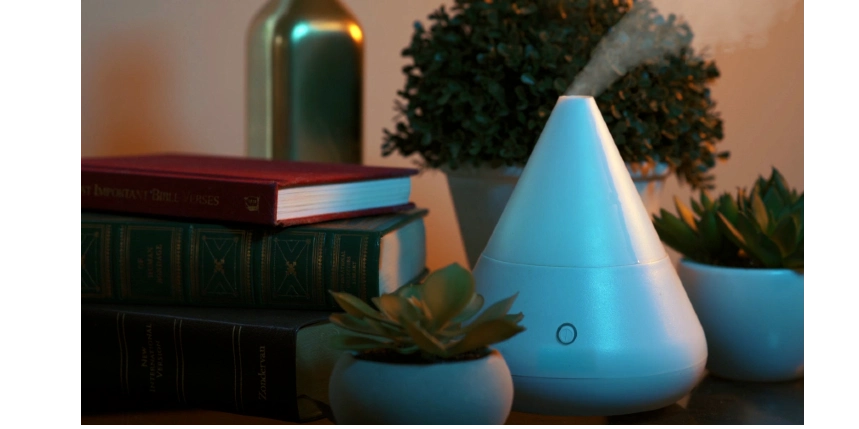Are Oil Diffusers Safe for Indoor Air Quality?

Homeowners use essential oils in mist diffusers for a variety of reasons. Many use them to help improve mood (lemon oil), boost the immune system (peppermint oil), assist with respiratory problems (rosemary oil), reduce airborne germs (pine oil), and eliminate unpleasant odors in the home (tea tree oil).
However, it’s important to be cautious when diffusing essential oils because not all benefit claims have been proven, and diffused incorrectly, some oils, like oregano oil, cinnamon bark oil, and ylang-ylang oil, can negatively impact air quality and pose a hazard to the health of your household.
First, What Is an Essential Oil?
Essential oils are chemical compounds that have been distilled from plants or other naturally occurring substances. Depending on the compound, they may be diffused in the air or added to beauty and self-care products and even foods.
The Safety of Essential Oil Diffusers: Cautions and Considerations
Before adding essential oils to your routine, consider the safety of both the oil itself and your chosen diffuser or application …
Remember that:
- Diffusing essential oils safely begins with your choice of diffuser. Pick a diffuser from a reputable brand. A high-quality diffuser will use less oil per use, saving you money, and the unit itself will last much longer.
- Not all essential oils are created equal. Some are diluted with other chemicals. Choosing a 100% pure, therapeutic-grade essential oil is recommended for most applications, including diffusers.
- Additionally, some oils are only suited for one purpose like diffusing. Be sure to understand which oils are best for the task at hand before you get started.
- Diffusing, ingesting, or wearing essential oils may have negative health impacts, including allergic reactions, difficulty breathing, and asthma attacks. Consult your physician before adding essential oils to your regimen.
- Essential oils are highly concentrated. It is best to use them in a well-ventilated area.
Choose Your Oils Carefully
If using a diffuser with pets in the home, allow them to move freely between rooms so they are not overexposed. It’s also essential to know what types of oils are, and are not, safe for your pets to be around. For instance, tea tree oil provides several benefits to humans, but should not be used around cats and dogs.
It’s also important to avoid essential oils labeled with the terms “fragrance” and/or “perfume.” These are made of synthetic chemicals used to mimic the scents of essential oils, and when placed in a diffuser can negatively affect the air quality in your home, as well as your health.
How to Use Essential Oil Diffusers: Step-by-Step
- Study the Instructions
Before using any diffuser, read the instructions thoroughly and use it according to those directions. Using your oil diffuser according to the instructions will help extend the diffuser’s life and ensure you aren’t over- or underusing oils. - Select a Good Location for the Diffuser
Diffuser location matters. Look for a spot near an electrical outlet that’s also solid and flat. Consider placing a towel below your diffuser if it’s sitting on a porous material like a wooden table. Think about the action of the diffuser—it sprays mist, so avoid having it point in the direction of bookshelves. Choose a place away from water-soluble materials and with enough airflow to allow your oils to dance about the room. - Add Water
Diffusers require water. If your water is hard, consider purchasing store-bought water for your diffuser. - Choose Your Oil
As mentioned previously, it’s important to select the right oil for your home. Do your research and make sure that the ones you choose are safe for your entire household—pets too! - Add Oil
Add oils to your diffuser AFTER adding water to the basin. Adding oil alone, or first, may cause damage to the unit. Follow oil-dosing recommendations carefully. Where essential oils are concerned, less is more. - Take Notes
In the first days and weeks your diffuser is running, keep a log of its effects. Is everyone in your household breathing normally? Are your pets acting the same? Is your home suddenly too humid? If you have noticed anything—off, adjust accordingly. - Keep It Clean
Follow the manufacturer’s instructions for cleaning and maintaining your diffuser.
Aire Serv = Air Quality
Diffusing essential oils is only one part of an indoor air quality improvement plan. If you’re concerned about the quality of the air you breathe at home, choose Aire Serv. Our local service professionals are indoor air quality experts. Request an appointment online today or call to get started.
 Click to call
Click to call


